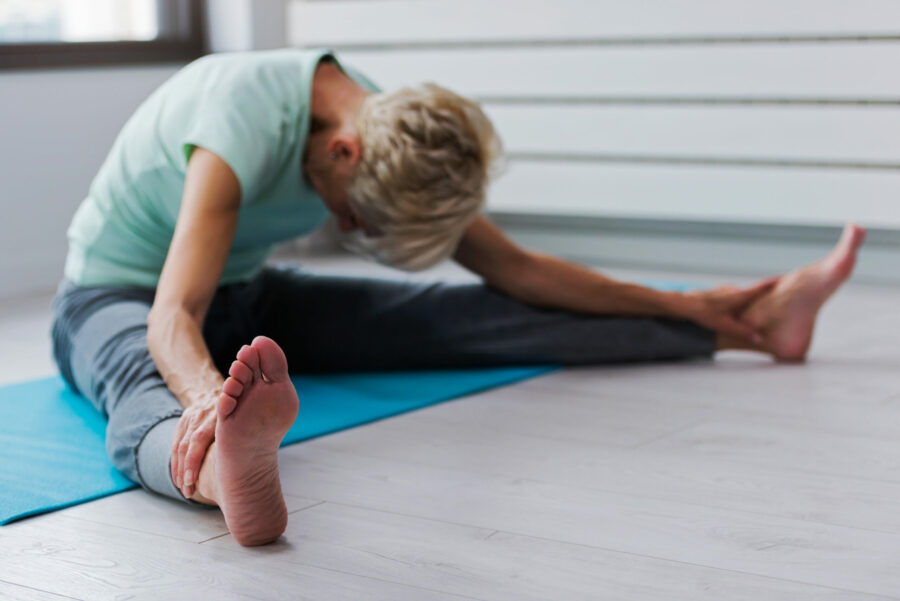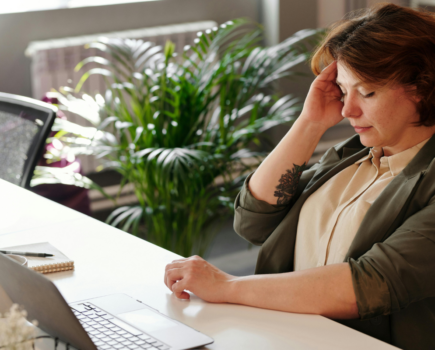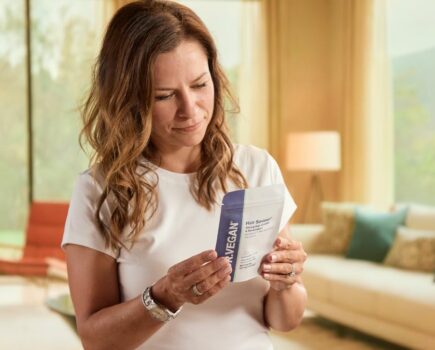Suzy Walker discovers Yin yoga, a gentle exercise class that delivers a radical life transformation.

I was feeling stuck, exhausted and hormonal when someone suggested I try a Yin yoga class. Normally the sort of person who might tackle stress and raging hormones by going for a run, I wasn’t overly enthusiastic about the recommendation of ‘lazy yoga’ (you spend most of this yoga class lying on your mat – not a dynamic sun salutation in sight).
But after my first 90 minutes class, I felt calm, quietly energised and the fog that had been hanging about my head magically lifted. I was hooked. I have taken a weekly Yin class ever since and it has helped me take charge of my mood, my hormones and my life.
Yin yoga is a slow and therapeutic style of yoga, in contrast to the more dynamic Yang styles such as Ashtanga or Vinyasa. (The concept of Yin and Yang has its roots in Taoism/Daoism, a Chinese religion and philosophy, which states that all things exist as inseparable and contradictory opposites. Yin represents the receiving force, yang the active. Neither pole is superior to the other, but a balance between two poles is recommended in order to achieve ‘harmony’ in the body and mind.)
What is Yin yoga?
In yoga, postures in Yin are mainly passive versus active, held for three to five minutes, encouraging the body to relax into a posture, working deeply into the fascia; the connective tissues of the body.
Yin yoga is known for radically improving your flexibility and releasing any tension that you may be holding. By deep breathing and targeting the fascia, you increase blood flow and circulation which encourages every organ to function properly, helping wounds heal faster and keeping your brain sharp.
But Yin yoga claims not only to improve your wellbeing on a physical level but also on an energetic one. It originated in California in the ‘70s, but was inspired by traditional Chinese Medicine (TCM), which works on the premise that the body contains meridians – invisible highways which carry ‘Chi’ (energy). Yin yoga is also said to work on these meridian lines.
Yin teaches us to pause and to soften, to listen to ourselves and to observe and be mindful of our feelings.
How does it work?
“I often call Yin yoga a needle-less acupuncture session,” says Sarah Powers, one of the world’s best known and most respected Yin yoga teachers: “Our body’s energy flow can densify, calcify, or stagnate when we don’t move our bodies outside of our more habitual ranges of motion. Obviously, this is why we do yoga postures. But coming into a pose in a consciously slow Yin way and staying for many minutes at a time helps us go into deeper energy corridors within and helps us creates a space to ventilate any kind of ‘inner stuckness.’
“Yin teaches us to pause and to soften, to listen to ourselves and to observe and be mindful of our feelings and observe the physical and emotional resistances in our bodies. As soon as we start observing versus resisting, our inner landscape begins to shift and morph. We are no longer stuck.”

A break of pace
If, like me, you’ve been stuck in your Yang energy – a day of running around doing errands and all the housework will do that to you! – then Yin invites you to stop doing and start being, stop pushing and start receiving and start opening up to new possibilities.
Sarah suggests that we combine our yoga practice with journaling and powerful questions like: What if I didn’t tell myself that I wasn’t enough? What do I know about myself that only a wise person would see in me?
“When we can listen more deeply to ourselves, we can listen more deeply to others, which creates more intimacy and humility, more connection,” says Sarah.
For me, Yin yoga helped me find that sense of inner harmony again, especially during the hormonal ups and downs of my menopause, something that Sarah says is a particular bonus for older women: “Yin is great for all people. And particularly for women over 50. There are so many shifts going on internally, hormonally and emotionally so it’s fantastic we have a practice that helps the system find its own equilibrium, in the midst of the inner shifts that can trigger lack of sleep, lack of patience, lack of feeling connected to our self.”
The sense of inner calm that I feel after each class is backed up by scientific studies, which have proven that Yin yoga lowers stress, anxiety and reduces the risk of depression –by activating our parasympathetic nervous system, which calms the body and slows your heart rate rather than stimulating the sympathetic nervous system, which triggers your fight-or-flight response.
Sarah Alice Lee, my yoga teacher who first introduced me to Yin, was a photographer in New Zealand when she took her own Yin yoga class: “I’m not being overdramatic, but Yin yoga quite literally saved my life.
“I was living in New Zealand when the Christchurch earthquakes of 2010 and 2011 hit and I became highly stressed and my physical health and mental health declined rapidly. No amount of running or consumption of wine seemed to achieve a state of relaxation or equilibrium in my body that I was so desperately needing.” Lee was diagnosed with depression and was prescribed anti-depressants and felt like she ‘was surviving rather than living’.
But Yin yoga helped her turn her life around. “Rather than keeping busy, trying to sweep my emotions and stresses under the rug in order to get through each day, I gave myself permission to be still, to stop running, stop with the distractions, stop the numbing and allow myself to feel, truly connected to me.”
Lee found the process so transformative that she trained as a yoga teacher, moved back to the UK and now teaches yoga in Sussex. “I didn’t think I was going to change career and become a yoga teacher, but the practice was so transformative that I became evangelical and just want to spread the word,” she smiles.
I know how she feels; my life is unrecognisable from what it was when I first started Yin yoga. I have left my very busy job to go freelance, have rented out my house to go travelling in a campervan and after years of being single, have a new boyfriend. No longer stuck or exhausted, I am back in the flow of life.
Sarah Powers is the founder and author of Insight Yoga, which brings together the insights and practices of yoga (Yin and Yang), Buddhism, Taoism, and transpersonal psychology. Her new book Lit from Within is out now.
Sarah Alice Lee runs workshops and yoga classes in Sussex.
For more health and wellness reads, head here.








